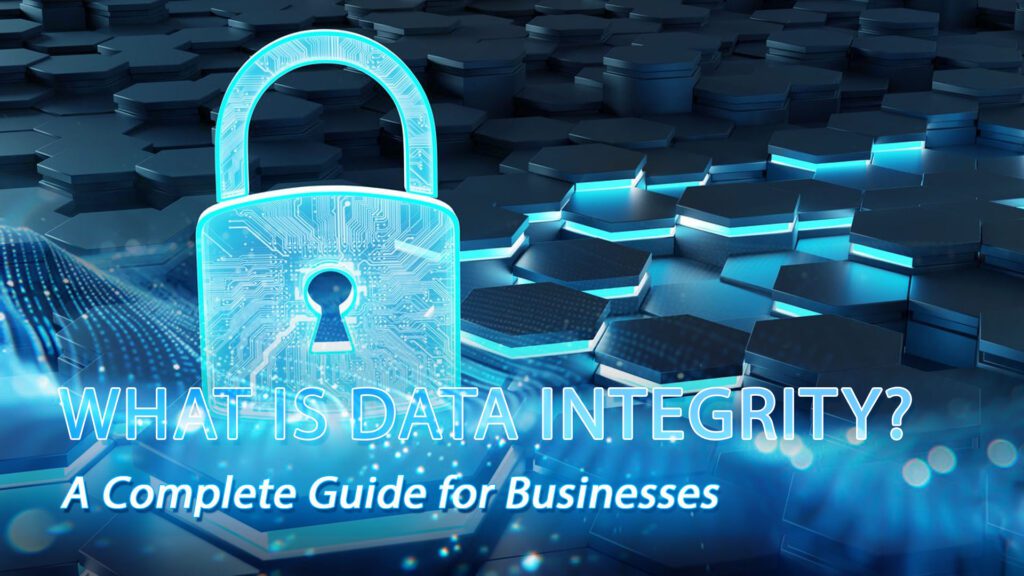Data integrity is the foundation of every information system, a standard that ensures data is always accurate, consistent, and reliable throughout its life cycle. This foundation plays a key role in every decision made based on data. This article is a comprehensive guide on what is data integrity, its importance, types, risks, to maintenance methods and future data trends.

What Is Data Integrity?
What is data integrity? It refers to the accuracy, consistency and reliability throughout the life cycle of data. This standard was created to ensure that data is kept intact and not changed by unauthorized or accidental actions, thereby maintaining the quality and reliability of the data.
In a simpler understanding, data integrity is to ensure that data is stored, processed and transmitted accurately, completely and without error.

To achieve the right standard, when implementing data integrity, there must be strict rules and procedures applied throughout the entire lifecycle of data, from the time the data is created until it is stored, processed, transmitted and deleted.
This standard is set not only to protect data from errors, but also to ensure that the logic and relationships between data sets are always accurately maintained.
Why Is Data Integrity Important?

Maintaining data integrity is an important factor for data-driven organizations. When accurate and reliable data is the basis for making the right business decisions. Lack of data integrity can lead to serious mistakes in decision-making, causing financial losses and undermining customer trust. The roles of this standard can be listed as follows:
- Making data-driven decisions: Accurate data is the key to making the right decisions.
- Increased operational efficiency: Consistent and reliable data helps streamline business operations (e.g., improving online shopping flows based on customer behavior data, offering promotions based on peak months).
- Regulatory compliance: Many industries have specific data integrity requirements that must be adhered to (e.g., customer data privacy regulations).
- Protect corporate reputation: Data breaches due to security incidents or inaccuracies can damage a company’s reputation.
- Financial stability: Inaccurate data can lead to financial losses due to misreporting, fraud, or other issues.
- Security: Building data integrity is also an important part of an overall cybersecurity strategy.
Types of Data integrity
There are two main types of data integrity, each focusing on a different aspect of data protection:
- Physical Integrity: This criterion is the protection of data from external incidents or natural disasters, such as power outages, hard drive failures, earthquakes, floods or other incidents. To ensure this criterion, organizations need to have strong backup and recovery systems, along with the use of reliable hardware devices. Data integration criteria will also play an important role in synchronizing data between different systems, minimizing the risk of data loss due to incidents or natural disasters.
- Logical Integrity: Refers to the accuracy and consistency of data when used, transmitted or stored. This criterion will include more detailed rules such as:
=> See more: 16 Essential Factors for Better Data Accuracy

Data Integrity vs. Data Quality vs. Data Security
As data management becomes more popular, these three concepts are often confused, but they have distinct and complementary meanings.
Data Integrity
It means that data needs to be accurate, consistent, and reliable. Data integrity will focus on protecting data from unwanted changes, whether intentional or accidental.
Data Quality
Data quality is a concept related to the usefulness of data for a specific purpose. This includes attributes such as accuracy, completeness, timeliness, and relevance to the general purpose. Data can have data integrity but still be of poor quality (e.g., data is accurate but out of date or missing essential information).
=> You might concern: How to Implement Effective Data Quality Control?
Data Security
This criterion focuses on protecting data from unauthorized access and preventing data from being corrupted or stolen. Data integrity is often a benefit of data security, but it only refers to the accuracy and validity of data, not the protection of data integrity.

What are the Most Common Risks to Data Integrity?
As we can see, data integrity always faces many potential risks. Common risks that can compromise data integrity include:
- Human error: Data entry errors, unintentional data changes, or improper data handling are among the leading causes of data corruption and failure to ensure data integrity.
- Bugs & viruses: Bugs or virus attacks can corrupt or delete data.
- Transfer errors: Errors that occur while moving data from one place to another, such as lost files or transmission errors.
- Compromised hardware: Hard drive failures, memory errors, or other hardware problems can corrupt data.
- Non-compliance: Failure to comply with data protection regulations such as GDPR or HIPAA can lead to data integrity issues and legal consequences.
How to Ensure and Maintain Data Integrity?

To ensure and maintain effective data integrity, here are some steps that any organization can take right away:
- Validate input: Organizations will need to establish rules to check and validate data as it is entered into the system, ensuring that it complies with defined formats and limits.
- Remove duplicate data: Use tools and processes to identify and remove duplicate records, helping to maintain data consistency.
- Backup & recovery: Regularly back up data and have a clear recovery plan in place to quickly restore data after incidents or natural disasters.
- Access control & audit trails: Limit access to sensitive data to authorized users only and record all logs made to the data, making it easy to track and detect unauthorized changes.
- Encryption & cybersecurity measures: Use encryption to protect data as it is transmitted and stored, and apply cybersecurity measures to prevent external attacks.
Future Trends in Data integrity

The future of data integrity will be shaped by some prominent and popular technology trends in the world every day:
- Artificial Intelligence and Automation: It is undeniable that AI is playing an important role and can be used to automatically detect and correct data errors, significantly improving accuracy and efficiency.
- Blockchain for data validation: Blockchain technology acts as an immutable, distributed ledger that can be used to securely verify and authenticate the integrity of data.
- Regulatory evolution: Data protection regulations will continue to evolve, requiring businesses to have increasingly stringent data integrity measures in place to ensure data integrity.
FAQs
How does data integrity impact business outcomes?
As a matter of course, high-integrity data is trusted because it provides maximum accuracy, consistency, and context. This data will always be available to make strategic decisions, helping organizations take quick, confident actions, attract, grow, and retain customers.
How do you secure data integrity?
Organizations can protect their databases with firewalls and security technologies. Enterprises can build and integrate security measures into the core of the data center environment by deploying technologies with an integrated approach.
Conclusion
Data integrity is not only a technical concept but also a strategic asset of the enterprise. Ensuring accurate, consistent and reliable data is the key to making informed decisions and optimizing business operations.
Enterprises that want to grow need to quickly invest in data integrity solutions, such as data integration tools and strong security measures, which are necessary steps to protect data from potential risks.
If you are still wondering about building a solid data foundation for your business, contact DIGI-TEXX immediately for advice and implementation of comprehensive data analysis solutions, helping your organization maximize the value from available data.
=> Explore more:


